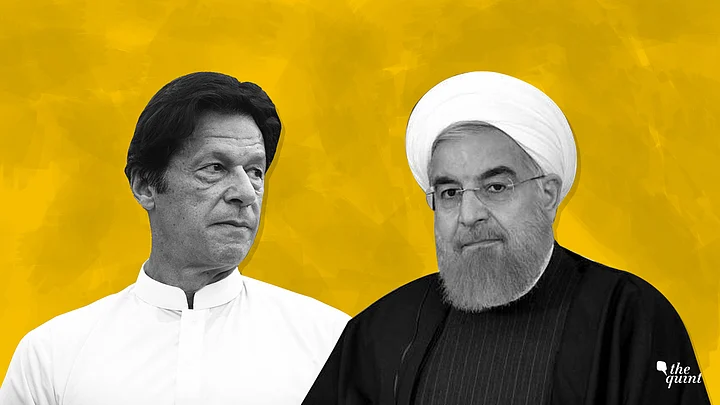Sitting beside Iranian President Hassan Rouhani at a joint press conference in Tehran on 22 April, Pakistani Prime Minister Imran Khan admitted that “Iran has suffered from terrorism, from groups operating within Pakistan”.
He was on his first official visit to Iran and his primary publicly-stated objective was to address the issue of terrorism which was, he confessed, becoming a “divisive” factor in Iran-Pakistan bilateral ties. Significantly, Khan specifically mentioned that Pakistan’s security chief was part of his delegation. This was obviously a reference to General Asim Munir, Director-General of the Inter-Services Intelligence (ISI).
The last major terrorist attack in Iran occurred on 13 February, one day before the Jaish-e-Mohammed’s Pulwama suicide terror strike. A bus carrying Iranian Revolutionary Guards was blown up by a suicide bomber in the Sistan-Baluchistan province, which borders Pakistan. 27 guards were killed and 13 injured.
A fundamentalist Sunni group, the Jaish ul-Adl, which reportedly has links with the al-Qaeda, claimed responsibility. It operates from the safety of its bases in Pakistan’s Baluchistan province.
Imran Khan’s Candour Hasn’t Found Favour
Pakistan does not formally accept that it harbours foreign-oriented terrorist groups on its territory. Hence, as Kamran Yousaf of the well-known Pakistan newspaper The Express Tribune noted, Imran Khan’s “bold statement created some controversy back home, with certain people questioning the wisdom behind publicly admitting the presence of anti-Iran groups”.
Too busy to read? Listen to this instead.
Certainly, the Pakistani military and diplomatic establishment were not happy with Khan’s candour, as can be gauged from what Yousaf further disclosed, “The transcript issued by the Foreign Office later omitted the reference”. It white washed its prime minister’s words by stating that “recently, 14 security forces killed in Baluchistan, and Iran has also suffered from terrorist activities”.
The problem of course, for the Pakistani spin masters, is that their prime minister’s words are on record and on video-tape; so, they will not be forgotten. Hence, they appear to be spreading a report that Pakistan provided evidence to Iran, which compelled it to change the head of the Iranian Revolutionary Guard, Mohammad Ali Jafri.
Does Pakistan Feel Vulnerable to Iran in the Context of Terrorism?
Certainly Pakistan perceives that Iran responds in kind to terrorist incidents. On 18 February, just a couple of days before Imran Khan was scheduled to visit Iran, ten naval, three air force, and one coast guard personnel were pulled out – after identification – of three or four buses on the Makran coastal highway, and killed. An umbrella organisation of Baluchi separatists, Raji Ajoi Sangar, claimed responsibility. Pakistan angrily blamed Iran for not taking action against them, despite ‘actionable intelligence’ given to it.
Pakistan is always concerned about Iran’s support to Pakistani Shia militant groups in their intense sectarian struggle against fundamentalist Sunni organisations, some of whom do not even consider the Shias as Muslims. These groups have enjoyed the patronage of the Arabian Peninsula countries in the past, and a sectarian proxy war was carried out in Pakistan. Obviously, Pakistan does not want those days to return.
The China-Pakistan Economic Corridor (CPEC) has become fundamentally important to Pakistan’s economic and diplomatic future. Gwadar and the CPEC arteries going through Baluchistan, are vulnerable to the actions of Baluchi separatists. China is very concerned about threats to the CPEC, and Pakistan has raised military formations to guard the CPEC infrastructure as well as the Chinese working on CPEC projects. Now if Iran begins to back Baluchi separatists in a significant way, Pakistan could be in deep trouble.
Shadow of West Asian Politics Looms Over Pakistan-Iran Ties
During Imran Khan’s visit, Iran and Pakistan decided to enhance security cooperation, and set up the Rapid Reaction Force. In view of the deep mutual distrust that exists in many quarters of the security establishment of both countries, it won’t be easy to coordinate anti-terrorist activities. Both countries may make a pretense of cooperation – and the Iranians are past masters at playing this game – but concrete results may not be easily achieved.
Terrorism apart, Khan’s Iran visit comes at a time when both countries are under enormous global pressures for different reasons. US President Donald Trump is pursuing Iran with a vengeance. The declaration of the Iranian Revolutionary Guards as a terrorist organisation, and the decision to deny any relief from sanctions to any country that purchases Iranian oil, are designed to bring the country’s security apparatus and its economy to its knees.
Pakistan’s economy too is under severe pressure, and the US is demanding that the Pakistani establishment should stop playing games over Afghanistan. These vulnerabilities will lead both countries to look at each other tactically for the time being.
The shadow of West Asian politics has always loomed over Pakistan-Iranian ties, and the present is no exception. Over the past few months, as Pakistan appealed to Saudi Arabia and the UAE for financial assistance, it tilted towards these countries in the Iran-Arab equation. At this time, Iran will allow Pakistan some room on this front.
Iranian and Pakistani interests demand that they do not open a major front against each other, but neither will refrain from needling each other when it feels that it needs to do so.
(The writer is a former Secretary [West], Ministry of External Affairs. He can be reached @VivekKatju. This is an opinion piece and the views expressed above are the author’s own. The Quint neither endorses nor is responsible for them.)
